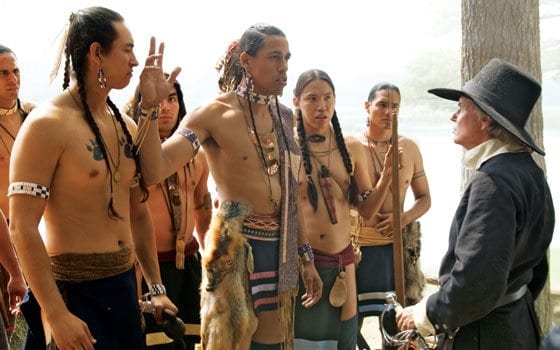
A groundbreaking five-part series and multimedia project debuting this Monday on the PBS program “American Experience” aims to promote Native American history from its often-overlooked position and take an in-depth look at the lasting contributions of the “original Americans.”
“We Shall Remain” includes five 90-minute documentaries spanning 300 years of American history from the Native American perspective, as well as public radio and online components designed to engage viewers from a grassroots level.
“We started this project five years ago,” said executive producer Sharon Grimberg. “The idea for the project came out of research for a larger project on American history in general, and we decided to take a look at the Native contributions, which are hardly discussed today.”
The first film in the series, “After the Mayflower,” documents the relationship between the Wampanoag and English settlers during the first Thanksgiving, which started out diplomatically, but eventually descended into a brutal war over who really had authority over the land. Chris Eyre, the film’s director and a member of the Cherokee and Arapaho tribes, said that this relationship was not as cut and dry as generally recorded in most documents about this part of American history.
“What you find is that nothing is simply black and white,” he said.
The same lesson applies to the series’ film about the life of Geronimo, the legendary leader of the Chiricahua Apache who fought against Mexican and U.S. attempts to expand into Apache tribal lands in the late 1800s.
While Geronimo has been largely praised in most historical accounts, some in his own tribe are troubled by the legacy he left behind — one Native person from the film recalls Geronimo as a murderer to Apache people.
“‘Geronimo’ reexamines who the man was and why white Americans hold him up on a pedestal, while members of his own Apache tribe have a very negative perspective of him,” Grimberg said.
Alternatively, the film “Tecumseh’s Vision” explores the lesser-known Shawnee leader’s attempt to rally various Native tribes in a mutual defense of their lands. His organizing efforts eventually led to his death in the War of 1812. Today, he is remembered by Native Americans for working to unite the race during that troubled time.
During the 1830s, many Cherokee tribes were removed from their lands by federal troops and forced to move west. In order to survive the discrimination they faced, many adopted Western lifestyles and converted to Christianity. Cherokee leaders established a republic with a European-style legislature and legal system.
The film “Trail of Tears” recounts the story of Major Ridge, a Cherokee leader and slave owner who not only urged his tribe to move west and rebuild, but also signed the removal treaty that eventually led to the Cherokees’ forced relocation to what is now Oklahoma.
Major Ridge is played by Wes Studi, a Cherokee actor who portrayed Geronimo in a 1993 biopic and can now be seen as Gen. Linus Abner in the new NBC series “Kings.” Though his long acting resume includes many roles playing Native Americans, Studi notes that he actually speaks Cherokee in “Trail of Tears.” He also said that his film will shift how Native Americans are portrayed in Hollywood.
“This [film] is the most historically accurate telling [of] this story in my lifetime,” Studi said. “Some people think we are victims, when in fact, we had a hand in our own destiny.”
In the final film, “Wounded Knee,” Native Americans are shown taking charge of that destiny on the night of Feb. 27, 1973, when 200 Oglala Lakota and American Indian Movement activists seized several major buildings near the original site of the Wounded Knee massacre of 1890, where approximately 300 Native Americans were killed by federal troops.
Sharing the same characteristics of the civil rights movement of a few years earlier, the protesters gained international notoriety for their 71-day siege, during which they demanded to be given an official apology from the U.S. government for transgressions spanning more than 100 years.
Directed by famed filmmaker Stanley Nelson, best known for his 2006 documentary, “Jonestown: The Life and Death of Peoples Temple,” “Wounded Knee” uses actual newsreel footage never before seen by the public.
Executive producer Grimberg said she hopes that “Wounded Knee” and the rest of the “We Shall Remain” series will spark renewed discussion of Native Americans’ place in society.
“I hope there is a new conversation about Native people,” she said. “Americans will get a totally new perspective.”
“We Shall Remain” premieres Monday, April 13, 2009, at 9 p.m. on WGBH Channel 2. For more information about the program, visit http://www.pbs.org/weshallremain.






